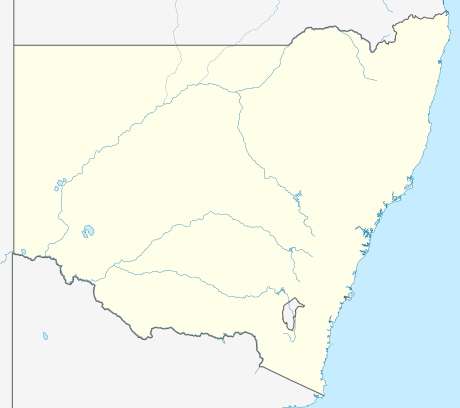Mandurama, New South Wales
| Mandurama New South Wales | |
|---|---|
|
Olive Street, the main street of Mandurama, looking north | |
 Mandurama | |
| Coordinates | 33°39′S 149°05′E / 33.650°S 149.083°ECoordinates: 33°39′S 149°05′E / 33.650°S 149.083°E |
| Population | 496 (2011 census)[1] |
| Established | 1839 |
| Postcode(s) | 2792 |
| Elevation | 662 m (2,172 ft) |
| Location | |
| LGA(s) | Blayney Shire |
| State electorate(s) | Bathurst |
| Federal Division(s) | Calare |
Mandurama is a village in the Blayney Shire, New South Wales, Australia. The site of the village and surrounding areas was home to the Wiradjuri people prior to settlement, and the name "Mandurama" is derived from their word for 'water holes'.[2] Mandurama is situated 259 kilometres west of Sydney, 59 kilometres southwest of Bathurst, and 47 kilometres northeast of Cowra on the Mid-Western Highway. Established in 1876 as a privately owned village for the workers of Thomas Icely's Coombing Park, it has since developed, along with nearby Lyndhurst into a modest service centre for the surrounding localities and farmland.
At the 2011 census, Mandurama and the surrounding area had a population of 496 people,[1] but is still home to a number of amenities, including a general store and cafe; service station; a New South Wales Rural Fire Service station; primary school; number of churches; golf club; tennis court; hall, and hotel. The village also retains a number of historic buildings, including two former bank premises, a former primary school, the Lincoln Theatre, and the Belubula Lodge.
Mandurama was also the central subject of the group of photographs known as the Mandurama Collection, now housed at the National Library of Australia.
A prominent pastoralist, Thomas Icely, came to the colony in 1820 as a trader. In 1823 he received a land grant of 800 hectares (2000 acres) at Saltram, in the Bathurst area. By 1831 Icely owned Coombing Park, and went on building up his acreage by purchase and further grant. By 1836 there were thirty convicts assigned to Icely's property and in September 1836 he asked the authorities for three more. Within a year he had 62 convicts at work at Coombing, assisting in the cultivation of 120 hectares (290 acres) and running sheep and cattle under two free overseers and was seeking five more convicts, but in 1839 the number had declined to fourteen in post, with a request for nine new assignees. Later Icely received a land grant of 3440 acres which he called Mandurama. About 1870 part of Coombing Park (under the management of Thomas Icely's eldest son, Thomas Rothery Icely) was sold to John Fagan who named his station Sunny Ridge. The 60,000 Sunny Ridge property originally included the Mandurama town site.
Royal Hotel established 1899. St Laurence O'Toole Catholic Church
See also
References
- 1 2 Australian Bureau of Statistics (31 October 2012). "Mandurama (State Suburb)". 2011 Census QuickStats. Retrieved 4 April 2015.
- ↑ "Mandurama". Geographical Names Register (GNR) of NSW. Geographical Names Board of New South Wales. Retrieved 26 October 2009.
External links
![]() Media related to Mandurama, New South Wales at Wikimedia Commons
Media related to Mandurama, New South Wales at Wikimedia Commons